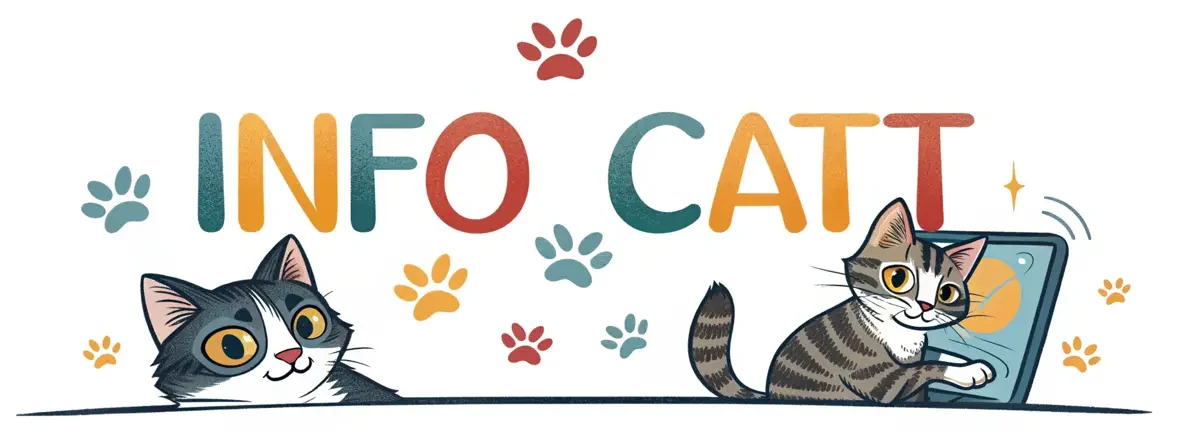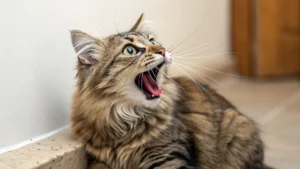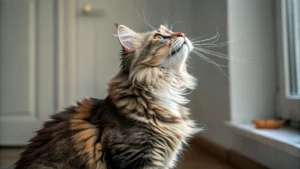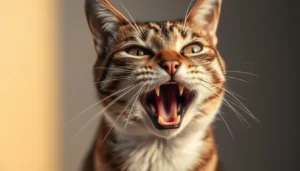Ever caught yourself watching your feline friend and noticed their breathing seems fast? This worry is normal for pet owners. It’s important to know the difference between normal breathing and health concerns.
Cat rapid breathing can have many causes. These range from simple environmental factors to serious medical conditions. While some reasons are harmless, others might need quick vet attention.
Understanding your cat’s breathing is like learning a new language. Each breath tells a story about their health and feelings. Whether they’re feeling warm, stressed, or facing a health issue, their breathing gives important clues.
Understanding Normal Cat Breathing Patterns
It’s important to know how your cat breathes to keep them healthy. Cats breathe differently than humans and other pets. Knowing when their breathing is not normal can help spot health issues early.
A healthy cat breathes calmly and steadily. They usually take 20-30 breaths per minute when they’re relaxed. This number can change based on their age, how active they are, and their overall health.
What’s a Healthy Breathing Rate for Cats?
To see if your cat’s breathing is healthy, watch them when they’re calm and sleeping. It’s important to know the difference between normal and abnormal breathing in cats:
- Resting respiratory rate: 20-30 breaths per minute
- Sleeping respiratory rate: Slightly lower, around 15-25 breaths
- Active or excited cats may breathe faster temporarily
In other part about your cat health recently had a stressful encounter, such as meeting a stray cat, it might be breathing fast due to anxiety. Learn more about what to do with a stray cat.
How to Count Your Cat’s Respiratory Rate
Counting your cat’s breaths is easy. Just watch their chest go up and down for one minute. Use a timer or watch to keep track of the breaths. Pro tip: Do this when your cat is calm and doesn’t know you’re watching.
Signs of Normal Cat Breathing
Normal cat breathing should be:
- Quiet and smooth
- Without visible chest strain
- Consistent rhythm
- No wheezing or unusual sounds
Remember, small changes are okay, but big or lasting changes mean you should see a vet.
Why Is My Cat Breathing Fast? Common Causes and Triggers
It’s important to know why your cat is breathing fast. This can range from simple stress to serious health issues. If your cat is breathing quickly while resting, watch for other signs and the situation.
Many things can make a cat breathe fast:
- Emotional stress from sudden changes
- Too warm room
- Recent exercise
- Anxiety or fear
Some cats breathe fast for less obvious reasons. This could be due to infections, allergies, or heart issues. Being overweight can also make breathing harder, leading to faster breathing.
When checking on your cat’s breathing, consider these points:
- How long they’ve been breathing fast
- Any other symptoms
- Their health history
- Any recent changes in their environment
Fast breathing now and then might not be a big deal. But if it keeps happening, you should see a vet. Your quick thinking can help spot health problems early.
Remember: Context is key when evaluating your cat’s breathing patterns.
Physical and Environmental Factors Affecting Cat Breathing
Cats are very sensitive, and their breathing can change a lot because of physical and environmental factors. Knowing about these can help you see when breathing problems might mean something serious.
Your cat’s breathing rate is not just about health. It’s also how they react to their surroundings. To know when to worry, you need to watch for different signs and understand what they mean.
👉 Temperature and Heat Impact
Extreme temperatures can really affect your cat’s breathing. Since cats can’t cool down well, they might breathe fast in hot weather. Also, humid air and direct sunlight can make breathing harder.
- High temperatures can cause rapid breathing as a cooling mechanism
- Humid environments increase respiratory stress
- Direct sunlight exposure may trigger faster breathing
👉 Exercise and Activity Level
Being active changes your cat’s breathing rate. Normal increased breathing after play or exercise is expected. But, if breathing stays fast, it could mean there’s a problem.
- Moderate play may cause temporary breathing acceleration
- Intense activity might reveal potential respiratory limitations
- Older cats may show more pronounced breathing changes during exercise
👉 Stress and Anxiety Effects
Emotions can really affect your cat’s breathing. Stress can make breathing patterns change, which you should pay attention to.
- New environments trigger anxiety-related breathing shifts
- Household changes can cause temporary respiratory stress
- Persistent anxiety might lead to chronic breathing irregularities
Remember, while these factors are common, persistent unusual breathing always warrants professional veterinary evaluation.
Medical Conditions That Cause Rapid Breathing in Cats
When your cat breathes quickly, it could mean several health issues. Knowing the signs of feline respiratory problems helps spot health problems early.
Respiratory infections often cause cat respiratory distress. Viral and bacterial infections can make breathing hard. Feline viral rhinotracheitis and pneumonia are big problems for breathing.
- Heart diseases like cardiomyopathy can cause rapid breathing
- Lung disorders such as asthma create breathing complications
- Tumors or growths in respiratory tract may obstruct normal breathing
Cats with chronic conditions like diabetes or kidney disease might also develop respiratory complications. These health challenges can trigger changes in breathing rate and depth, signaling potential underlying medical concerns.
Specific signs of feline respiratory problems include:
- Persistent open-mouth breathing
- Wheezing or crackling sounds
- Blue-tinged gums
- Extreme lethargy
Always consult your veterinarian if you notice unusual breathing patterns. Early detection and professional diagnosis can prevent serious health complications.
Emergency Signs: When Fast Breathing Requires Immediate Vet Care
Knowing when your cat is in trouble can save their life. Some breathing issues need fast vet care. It’s crucial to act quickly.
If your cat is breathing hard with their mouth open, it’s a big warning sign. Not all fast breathing is bad. But some signs mean you need to get help right away.
Red Flag Symptoms to Watch
- Persistent open-mouth breathing
- Bluish or pale gums
- Breathing with extended neck
- Noticeable chest wall movements
- Crackling or wheezing sounds
Life-Threatening Conditions
Some serious problems can cause your cat to breathe hard. These include:
- Heart failure
- Severe asthma attacks
- Pneumonia
- Pleural effusion
- Pulmonary edema
When to Rush to the Emergency Vet
If you see these signs, get to the vet fast:
- Extreme difficulty breathing
- Breathing with open mouth for more than a few minutes
- Visible distress or panic while breathing
- Collapsing or losing consciousness
Your quick response can be critical in preventing potential life-threatening complications.
How to Help Your Cat During Episodes of Fast Breathing
When you see your cat breathing hard, stay calm. Cats pick up on our stress, which can make their breathing worse. Quick, caring actions can help a lot with their breathing problems.
First, make a quiet, cozy spot for your cat. Cut down on loud noises and stressful things that might make them breathe fast. Make sure they have fresh water and a cool, airy place to rest.
- Gently remove your cat from hot areas
- Provide cool, fresh water
- Use a fan to create gentle air circulation
- Keep your cat in a calm, quiet room
Watching your cat’s breathing is important. Count how many times they breathe in a minute. If it’s over 30, it might be a sign of trouble. Look out for these signs:
- Open-mouth breathing
- Wheezing or crackling sounds
- Extended neck while breathing
- Blue-tinged gums
“Your observational skills can be lifesaving for your feline friend.”
Even with your best efforts, some breathing issues need a vet right away. If your cat’s breathing doesn’t get better or if they show other bad signs, call your vet fast. Always get help if your cat’s breathing seems really off.
Prevention and Management Strategies for Respiratory Issues
Keeping your cat’s respiratory health in check is crucial. Knowing the signs of respiratory problems can help you create a safer space for them. By understanding what causes rapid breathing in cats, you can take steps to prevent it.
👉 Regular Health Screenings
- Schedule annual vet visits
- Ask for detailed respiratory checks
- Keep vaccinations up to date to fight off infections
- Watch your cat’s weight and overall health
👉 Environmental Modifications
Your home’s environment is key to your cat’s respiratory health. Here are some changes to make:
- Use air purifiers to cut down on allergens
- Keep living areas clean and dust-free
- Avoid smoking around your cat
- Control humidity levels
👉 Lifestyle Adjustments
Simple changes in your cat’s lifestyle can help a lot:
- Feed a balanced diet
- Encourage gentle play
- Keep their environment calm to reduce stress
- Limit exposure to things that might irritate their breathing
Early detection and prevention are key to managing potential respiratory challenges in cats.
Conclusion
Knowing why your cat breathes fast is key to their health. It’s important to tell normal breathing from abnormal. This helps keep your cat safe from health problems.
When your cat breathes fast, many things could be the reason. It could be something in their environment or a health issue. Regular vet visits and watching your cat closely are crucial for their health.
Watching your cat’s breathing is more than just finding problems. It’s about taking care of them before they get sick. A calm home, less stress, and knowing what can upset their breathing can help a lot. This way, you can catch any health issues early.
Your effort to understand your cat’s breathing shows how much you care. With the right knowledge, care, and vet advice, your cat will stay healthy and happy. They’ll also breathe easily.
FAQ
What is considered a normal breathing rate for cats?
A healthy cat at rest usually breathes 20-30 times per minute. When they’re relaxed and sleeping, they might breathe even less. If your cat breathes more than 40 times per minute while resting, it could mean they’re not feeling well.
How can I check my cat’s breathing rate at home?
To check your cat’s breathing, watch their chest for 30 seconds. Then, multiply that number by two. Use a timer to count their breaths when they’re calm. Count each full breath cycle as one.
Why is my cat breathing fast while resting?
Cats breathe fast for many reasons, such as heat, stress, or health issues. They might be too hot, stressed, in pain, or have a medical problem. If their fast breathing doesn’t go away, see a vet.
When should I be worried about my cat’s rapid breathing?
Be worried if your cat’s fast breathing comes with other signs. Look for open-mouth breathing, blue or pale gums, or a stretched neck. Also, watch for obvious distress, panic, or persistent fast breathing.
Can stress cause my cat to breathe fast?
Yes, stress can make cats breathe quickly. Changes, new pets, loud noises, or vet visits can cause anxiety. This can lead to fast, shallow breaths.
Is panting normal for cats?
Cats don’t usually pant like dogs do. But, they might pant after playing hard or in very hot weather. If your cat pants a lot, it’s best to check with a vet.
Can heat cause my cat to breathe faster?
Yes, heat can make cats breathe faster. They try to cool down by breathing more. Keep them cool, provide water, and make sure they have shade and hydration.
What medical conditions can cause rapid breathing in cats?
Many health issues can cause fast breathing in cats. These include asthma, infections, heart disease, and more. It’s important to watch for other symptoms too.
How can I help my cat if they’re breathing rapidly?
If your cat is breathing fast, keep them calm and quiet. Move them to a cool spot and give them fresh water. Watch for signs of distress and contact a vet if needed.
Are some cat breeds more prone to breathing issues?
Yes, some breeds like Persians and Himalayans have breathing problems. Their flat faces make it hard to breathe. They can also get stressed or overheated easily.



